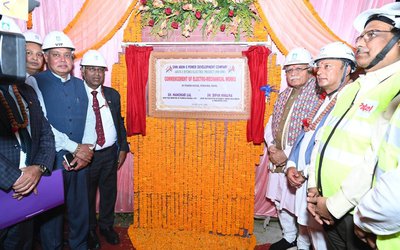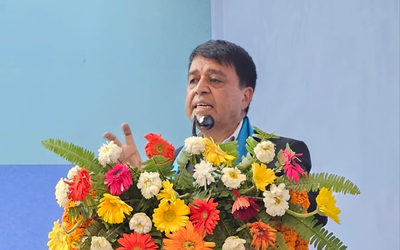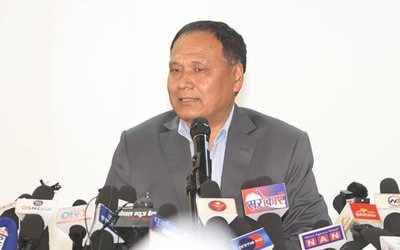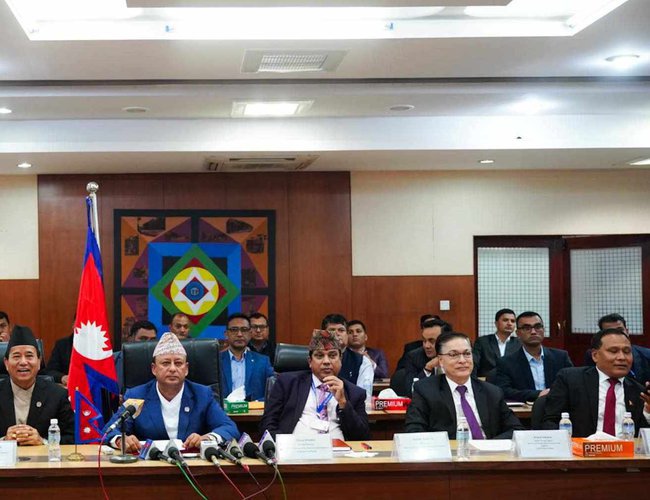
A decade ago, enduring a significant power outage lasting over 13 hours rendered the notion of exporting electricity to India and Bangladesh seemingly far-fetched or even laughable. However, through relentless effort and commitment, Ghising, the Managing Director of the Nepal Electricity Authority (NEA), has diligently worked to demonstrate that Nepal is capable of exporting electricity to these neighboring countries, thereby enhancing its economic prospects.
While various ministers in Nepal, including the recently appointed Minister Dipak Khadka, are vying for recognition of this achievement, it is the combined insight of senior political leaders from both India and Nepal, along with the unwavering dedication of MD Ghising, that has facilitated this progress. Following successful exports to India, Nepal has now commenced electricity sales to Bangladesh, with the NEA exporting 40 MW of electricity on November 15.

The inaugural trilateral power transaction from Nepal to Bangladesh was jointly launched by Union Minister for Power and Minister for Housing and Urban Affairs Manohar Lal Khattar during a virtual event organized by Nepal's Ministry of Energy, Water Resources, and Irrigation. Khattar, alongside Md Fouzul Kabir Khan, Advisor to Bangladesh's Ministry of Power, Energy and Mineral Resources, and Nepal's Minister for Energy, Water and Irrigation Dipak Khadka, marked the commencement of this power flow transaction, which was facilitated through the Indian grid.
A recent press release indicates that a power transaction from Nepal to Bangladesh via the Indian grid will facilitate the export of up to 40 MW of electricity. This agreement was initially announced in June 2023, coinciding with the visit of former Nepalese Prime Minister Pushpa Kamal Dahal to India from May 31 to June 3. During this visit, both nations reaffirmed their dedication to enhancing sub-regional cooperation, particularly in the energy sector, which is expected to foster greater interconnectivity among their economies for the benefit of all involved parties.
Following the inauguration, Union Minister Khattar remarked that this initiative would be advantageous for all three countries in the region. He stated, "The power departments of the three countries have entered into an agreement for Regional Cooperation in Power Purchase, Sale, Distribution, and Transmission, whereby Nepal has committed to supplying 40 MW of hydropower to Bangladesh. The Nepalese government is utilizing India's transmission grid to deliver its electricity to Bangladesh... I believe this will be beneficial for all three nations." Additionally, a tripartite power purchase agreement was formalized in Kathmandu in October this year, involving NTPC Vidyut Vyapar Nigam, Nepal Electricity Authority, and Bangladesh Power Development Board.
The initiation of power transmission from Nepal to Bangladesh via India is anticipated to improve sub-regional connectivity within the energy sector, as stated in the announcement. According to the tripartite agreement established approximately six weeks ago, the Nepal Electricity Authority (NEA) has dispatched 40 MW of electricity to Bangladesh. Power Minister Deepak Khadka officially launched the power export during a virtual ceremony held at the Ministry of Power. The event was attended by ministry officials, NEA Managing Director Kulman Ghising, and other dignitaries.
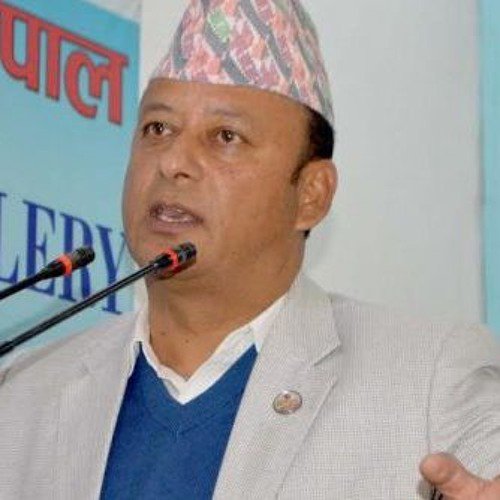
The NEA has been supplying electricity generated from the 25 MW Trishuli and 22 MW Chilime hydropower projects, which were constructed with Indian financial assistance and are owned by India, to Bangladesh. Following six years of preparatory work, an agreement was finalized on October 17 among Nepal, Bangladesh, and India for the sale and purchase of 40 megawatts of electricity.
This tripartite agreement was necessary due to the requirement of utilizing India's transmission infrastructure to facilitate the export of electricity from Nepal to Bangladesh. The agreement stipulates that the NEA will provide electricity to Bangladesh from June 15 to November 15 each year. This year, electricity was exported to Bangladesh for a single day on Friday.
The authority will receive 6.40 US cents per unit in accordance with the agreement. The board has been engaged in the export of electricity via the Dhalkebar-Muzaffarpur 400 kV transmission line.
According to the authority, the electricity has been transmitted to Bangladesh through the 400 kV line connecting Muzaffarpur to India's Prasaran Bahrampur-Bher transmission line.
In a notable advancement for regional energy collaboration, Nepal has officially commenced the export of electricity to Bangladesh. The export of 40 megawatts of electricity produced in Nepal began on Friday.
This marks a historic achievement in Nepal's ambition to establish itself as a significant energy exporter in South Asia, capitalizing on its rich hydropower resources. The virtual inauguration of the power export took place on Friday afternoon, featuring Dipak Khadka, Minister for Energy, Water Resources and Irrigation of Nepal, Manohar Lal, Minister for Power of India, and Muhammad Fouzul Kabir Khan, Advisor to the Power Division of the Ministry of Power, Energy and Mineral Resources of Bangladesh.
This is the inaugural instance of electricity generated in Nepal being exported to a third nation, as previously, Nepal has only engaged in electricity trade with India. On October 3, 2024, a tripartite power purchase agreement was executed among the Nepal Electricity Authority, NTPC Vidyut Vyapar Nigam (NVVN) of India, and the Bangladesh Power Development Board (BPDB) to facilitate the export of 40 megawatts of electricity from Nepal to Bangladesh through the Indian grid.
The electricity produced in Nepal will be transmitted to the Muzaffarpur substation in India via the inaugural cross-border Dhalkebar-Muzaffarpur 400 kV transmission line. Subsequently, power will be delivered from the Muzaffarpur substation to Bangladesh through the Behrampur (India)-Bheramara (Bangladesh) 400 kV transmission line. The export of electricity from Nepal to Bangladesh commenced at 12:30 PM on Friday and continued for a duration of 11 hours and 30 minutes until midnight.
According to the Nepal Electricity Authority (NEA), the export of electricity to Bangladesh will recommence on June 15, 2025. Nepal plans to supply electricity to both India and Bangladesh exclusively during the monsoon season. On Thursday, the Central Electricity Authority, which operates under the Ministry of Power of India, sanctioned the export of 40 megawatts of electricity—comprising 18.60 MW from the Trishuli hydropower project and 21.40 MW from the Chilime hydropower project—to Bangladesh.
This approval allows for the export of 40 megawatts of power generated from these two projects to Bangladesh until October 2, 2029. Both projects have also received authorization to export electricity to India. The NEA will provide 40 megawatts of electricity to Bangladesh during the six-month rainy season, from June 15 to November 15 each year, over a period of five years. The NEA has indicated that the electricity trade between Nepal and Bangladesh will be conducted in U.S. dollars.
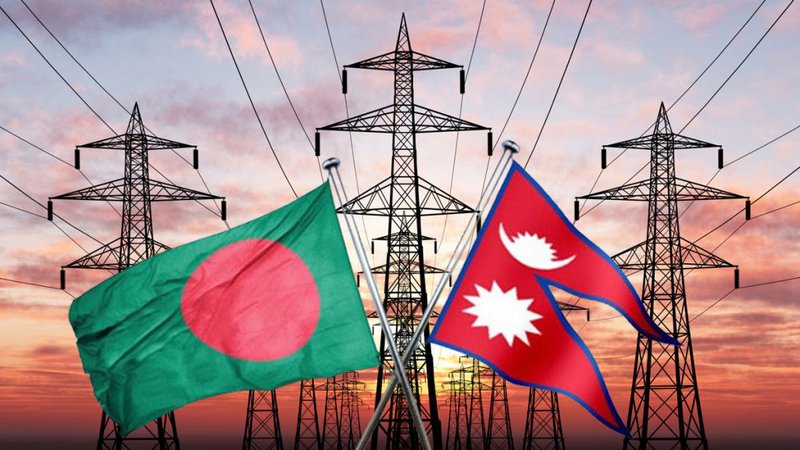
The authority will generate 6.40 US cents per unit (equivalent to Rs. 8.62 based on Friday's exchange rate) through the sale of electricity to Bangladesh. This marks the first occasion on which Nepal will earn revenue in dollars from electricity sales, as previous transactions with India were conducted in Indian rupees. The Nepal Electricity Authority (NEA) has received USD 28,160 (approximately Rs. 3,793,433) for exporting 40 MW of electricity to Bangladesh over a duration of 11.30 hours on Friday.
The payment for the electricity exported to Bangladesh will be received at the Muzaffarpur point in India. The NEA will be responsible for any technical losses incurred during the transmission from Dhalkebar to Muzaffarpur. Beyond the Muzaffarpur point, Bangladesh will assume responsibility for all applicable taxes and charges, including those related to the transmission line, leakage, NVVN, and the trading margin imposed by India.
Historic milestone
During this event, Minister Khadka remarked that the export of electricity from Nepal to Bangladesh represents a historic milestone for the nation. "This achievement reflects our collective vision for a sustainable and interconnected energy future in South Asia," he stated. "This power trade transcends mere electricity; it signifies a move towards energy security, economic development, and environmental sustainability for all our countries. It underscores our mutual commitment to clean, reliable energy and a regional shift towards renewable resources," Minister Khadka further elaborated.
He expressed gratitude to the Government of India for its role in facilitating the export of electricity to Bangladesh, as well as to the Government of Bangladesh for its importation of power from Nepal. Minister Manohar Lal commended the initiative to extend electricity access to South Asian nations via India's transmission infrastructure.
He noted that India has made significant investments in various hydropower projects in Nepal, and the successful completion of these initiatives would enhance the prospects for electricity trade. Furthermore, he indicated India's willingness to assist in the advancement of power generation in Nepal, emphasizing that such agreements would promote the sustainable development of green energy.
Advisor Muhammad Fouzul Kabir Khan remarked that these agreements would significantly bolster regional energy security. He highlighted that such collaboration would enrich South Asian nations through integrated energy development and contribute to sustainable progress. He expressed confidence that Nepal's hydropower resources would support Bangladesh in its pursuit of a zero carbon emission policy, facilitating a transition towards renewable energy and economic growth.
This partnership represents a crucial advancement towards achieving our goal of becoming a prominent exporter of renewable energy within the South Asian region.

Keshab Poudel
Poudel is the editor of New Spotlight Magazine.
- KUL MAN GHISING: Bowing Down To The People
- Apr 13, 2025
- POLITICAL VIOLENCE: Culture of Impunity
- Apr 11, 2025
- PM OLI MEETS PM MODI: No Progress
- Apr 09, 2025
- PM OLI’S THAILAND VISIT: Flip Flop
- Apr 08, 2025
- FM Dr. Deuba’s India Visit: Mission Aborted
- Mar 26, 2025
